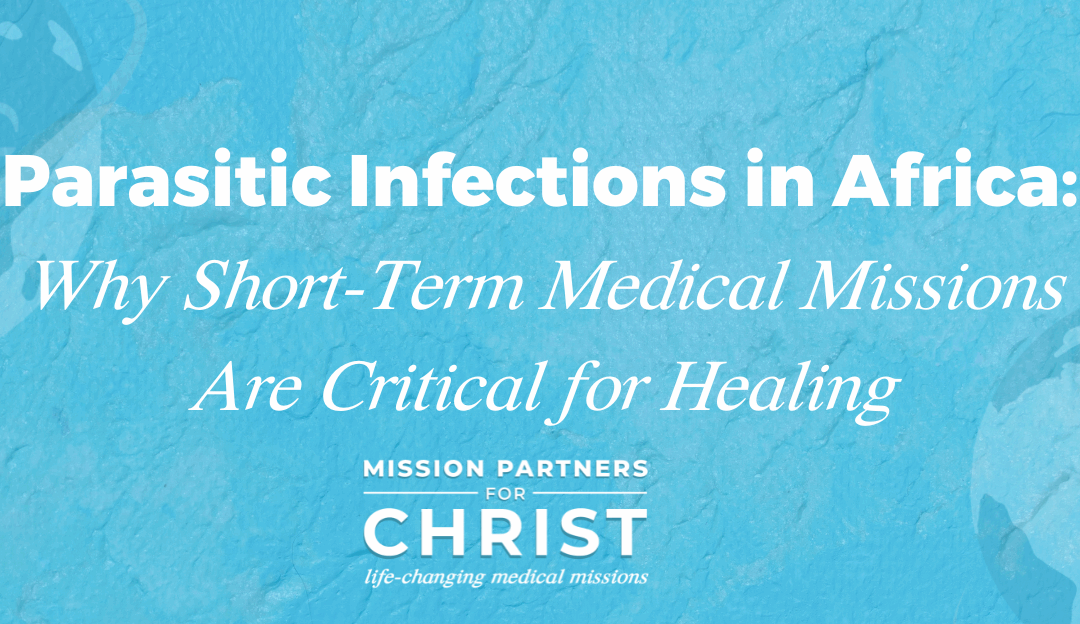“He sent them out to proclaim the kingdom of God and to heal the sick.” – Luke 9:2
In remote villages all across the African continent, a hidden enemy silently steals strength, hope, and futures. Parasitic infections affect hundreds of millions across the continent, creating invisible chains that bind communities in cycles of poverty, illness, and despair. Yet in these same places where microscopic invaders wreak havoc, we witness the profound power of medical missions to bring both physical healing and spiritual hope.
The Unseen Battle
Parasitic infections represent one of Africa’s most persistent health challenges. Unlike acute illnesses that demand immediate attention, these conditions often develop slowly, gradually robbing their victims of energy, cognitive function, and quality of life. The most common culprits include:
Medical missions embody Christ’s compassion while demonstrating the practical love that makes the Gospel message tangible and real.
Malaria parasites transmitted through mosquito bites affect over 200 million Africans annually. Despite being preventable and treatable, malaria remains a leading killer, particularly among children under five and pregnant women.
Intestinal worms such as roundworms, hookworms, and whipworms infect nearly 1.5 billion people worldwide, with Africa bearing a disproportionate burden. These parasites, transmitted through contaminated soil and poor sanitation, cause malnutrition, anemia, and impaired development in children.
Schistosomiasis, spread through contact with contaminated freshwater, affects over 240 million people globally, with 90% of cases occurring in Africa. This disease damages the bladder, kidneys, and liver while significantly impacting children’s ability to learn and thrive.
Sleeping sickness (trypanosomiasis), transmitted by tsetse flies, threatens 65 million people across 36 African countries. Without treatment, this disease proves fatal, yet it remains largely neglected in global health discussions.
Pathways of Transmission
These parasites exploit the very conditions that define daily life for millions of Africans. Contaminated water sources serve as breeding grounds for disease-carrying vectors. Poor sanitation systems allow parasites to complete their life cycles in human waste. Lack of protective measures like bed nets and proper footwear creates easy entry points for infection.
The transmission patterns reveal a harsh reality: those least equipped to protect themselves face the greatest risk. Rural communities without access to clean water, adequate sanitation, or health education remain trapped in environments where parasitic infections flourish.

The Treatment Divide
Remarkably, many parasitic infections can be treated with relatively simple, cost-effective medications. Antimalarial drugs, antiparasitic medications, and preventive treatments exist and have proven effective. The tragedy lies not in the absence of cures, but in the chasm between available treatments and those who desperately need them.
For families living on less than $2 per day, even basic medications remain out of reach. A course of antimalarial treatment might cost the equivalent of several days’ income. Preventive measures like insecticide-treated bed nets, though highly effective, require initial investments that stretch beyond many families’ means.
Healthcare infrastructure compounds these challenges. Remote communities may lie hours or days from the nearest health facility. When treatment is available, transportation costs, lost wages from time away from work, and cultural barriers often prevent families from seeking care until conditions become severe.

The Mission Field Calling
This convergence of treatable diseases and limited access creates a unique opportunity for medical mission teams. Short-term medical missions can provide immediate, life-changing interventions while addressing the root causes that perpetuate these health challenges.
Medical teams bring more than medications; they bring hope to places where suffering has become normalized. When a missionary nurse administers deworming medication to a malnourished child, she doesn’t just treat parasites—she restores the possibility of normal growth and development.
When a physician treats a pregnant woman for malaria, he doesn’t just save one life—he protects an entire family’s future.
Education represents an equally vital component of medical missions. Teaching communities about disease prevention, proper water treatment, and sanitation practices creates lasting change that extends far beyond the mission team’s visit. These educational efforts break cycles of reinfection and empower communities to protect themselves.
Medical teams bring more than medications; they bring hope to places where suffering has become normalized.
Healing Bodies, Touching Souls
The parallel between physical parasites and spiritual bondage runs deep through Scripture and human experience. Just as parasites silently drain physical strength, sin creates invisible chains that rob us of abundant life. Both operate in darkness, both steal what was meant for flourishing, and both require intervention from outside ourselves.
When medical mission teams arrive in African villages carrying medications and hope, they mirror Christ’s own ministry. Jesus healed the sick not merely to address physical symptoms, but to demonstrate the kingdom of God breaking into a broken world. Each parasite treated, each fever broken, each child restored to health serves as a tangible sign of God’s desire to heal every aspect of human suffering.
The Apostle Luke, himself a physician, understood this connection between physical and spiritual healing. Throughout his Gospel, he records how Jesus consistently addressed both bodily ailments and spiritual needs, recognizing that true healing encompasses the whole person.
The Ripple Effect
The impact of treating parasitic infections extends far beyond individual patients. When children are freed from the cognitive impacts of chronic parasitic infections, their academic performance improves, creating opportunities for education and economic advancement. When adults receive treatment for debilitating conditions like schistosomiasis, they can return to productive work, supporting their families and contributing to their communities.
These health improvements create upward spirals that can lift entire communities. Families invest in better nutrition, sanitation, and education when they’re not constantly battling preventable diseases. Communities become more resilient and hopeful when they see tangible evidence that change is possible.
A Call to Action
The need for medical missions in Africa remains urgent and vast. Parasitic infections continue to steal futures, limit potential, and perpetuate poverty across the continent. Yet the solutions exist, and the opportunities for impact are profound.
Medical mission teams serve as instruments of God’s healing power, bringing both physical restoration and spiritual hope to places where both are desperately needed. They embody Christ’s compassion while demonstrating the practical love that makes the Gospel message tangible and real.

In treating parasitic infections, we don’t just address medical conditions—we break chains of poverty, restore dignity, and point toward the ultimate healing found in Christ. We participate in God’s redemptive work, bringing light to dark places and hope to situations that seem hopeless.
The call remains clear: as Christ sent His disciples to heal the sick and proclaim the kingdom, He continues to call His followers to carry both medical expertise and Gospel hope to the world’s most vulnerable places. In treating parasites, we treat the whole person. In healing bodies, we touch souls. In serving others, we serve Him.
“The Spirit of the Lord is on me, because he has anointed me to proclaim good news to the poor. He has sent me to proclaim freedom for the prisoners and recovery of sight for the blind, to set the oppressed free.” – Luke 4:18


